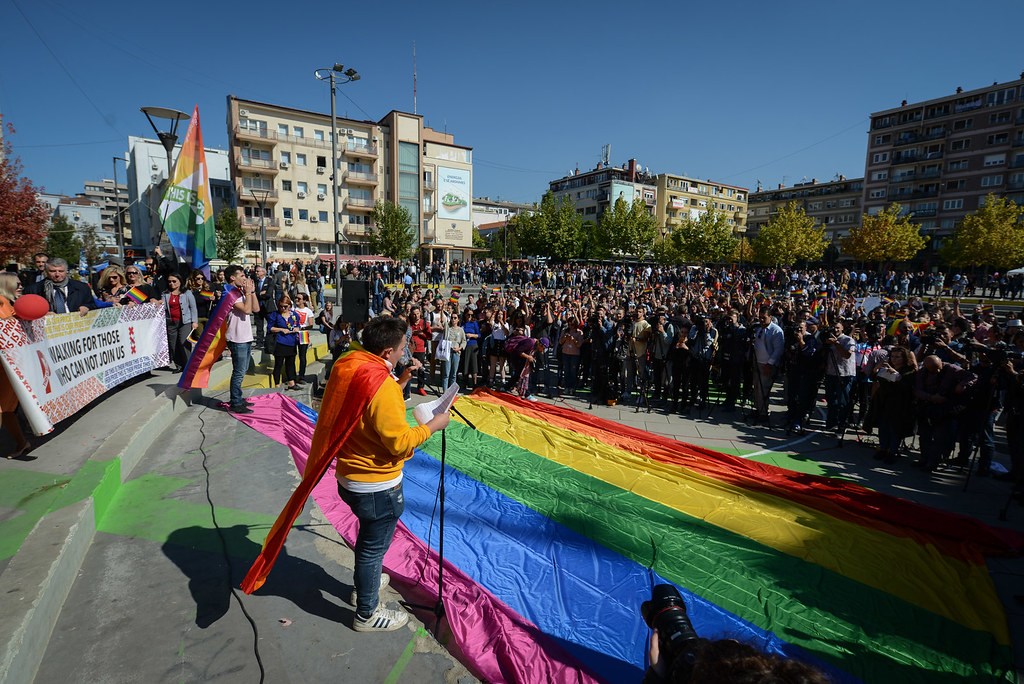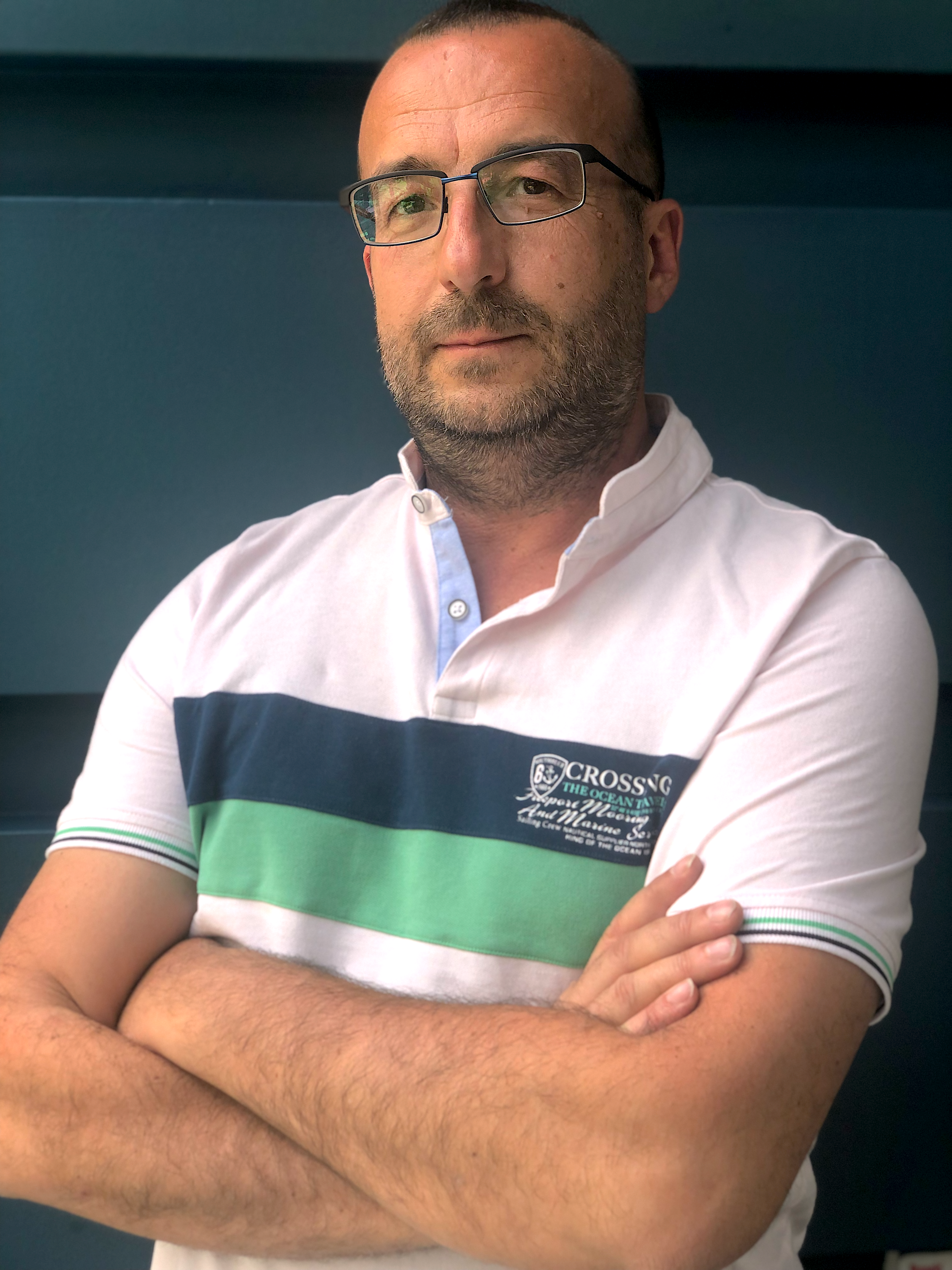
How would you characterise members of the LGBTI (lesbian, gay bisexual, transgender and intersex) community? The average Kosovar’s answer to this question includes extravaganza, the rainbow flag, and the Pride Parade. Such stereotypes are mainly a result of the limited information provided by mass media, combined with the traditional constraints that slow down society’s process of opening up. But there is much more to be said about Kosovo’s LGBTI community than just the Pride Parade, and not everything is as colourful as it appears in pictures.
“We organise the Pride Parade to raise awareness about the rights of the LGBTI community, but mainly to voice our concerns about the violation of those rights. Basically, it is a protest walk,” says Arber Nuhiu from CSGD, the Center for Social Group Development.
The organisation is one of the most important civil society bodies working to improve the position of the community and is the key organiser of all the events that take place around the Pride Parade. In recent years, the event’s headline was same-sex marriage, a legal right that is denied by Kosovo’s institutions although guaranteed by the Constitution. CSGD and other LGBTI and human rights organisations have lobbied for years for this provision to be included in the new Civil Code, but their calls so far have been ignored.
“We organise the Pride Parade to raise awareness about the rights of the LGBTI community, but mainly to voice our concerns about the violation of those rights. Basically, it is a protest walk.”
Arber Nuhiu, CSGD
“Our approach has been systematic in pursuit of our objective. We know what we want, and we know how to do it,” Nuhiu says, referring to the advocacy work for the community. He gives credit to the European Union for being there for them when it was most needed. CSGD received an operational grant from the EU to strengthen the organisation’s capacities, enabling it to better serve the community.
The LGTBI community in Kosovo recently celebrated their first achievement when they managed to include provisions that broaden the legal protection for LGBTI people in the new Criminal Code. This was a direct success of strategic advocacy. However, there is a continuing struggle for the implementation of the legal framework. Cases of hate crime against LGBTI individuals are usually not properly investigated or brought to court. The community believes that the next improvement needs to take place amongst the state bodies that prosecute, investigate and execute pass judgments. That is why LGBTI organisations are also active in training police, prosecutors and judges on best practices.
Bringing the service to where the problems are
CSGD’s experience spans almost two decades of interacting and supporting the community. Its experience shows that there are two LGBTI realities in Kosovo: one is life in the capital Prishtina/ Pristina, and the other in the rest of the country where the situation is grim. The capital is the place where LGBTI people gain some freedom, but the coronavirus pandemic has, for reasons that range from interrupted education to losing a job, forced them to go back home.

“ LGBTI people’s biggest fear is not being accepted, primarily by their family. We cannot imagine the pressure they have in their homes. Every day. Second, comes the fear of not being accepted by society.”
Arber Nuhiu, CSGD
“LGBTI people’s biggest fear is not being accepted, primarily by their family. We cannot imagine the pressure they have in their homes. Every day. Second, comes the fear of not being accepted by society,” says Nuhiu.
As a result, since the start of the pandemic there has been a spike in the number of people seeking counselling support and in the number of cases of violence. CSGD’s response was already being developed: an online platform providing professional and free counselling and legal support to everyone. The platform is the latest achievement of CSGD’s mission that leads to further empowerment of the community. Now the organisation is there in digital form for every LGBTI Kosovar in need, wherever they live.
About the programme
The European Union funded the organisation Center for Social Group Development and its core activities within the national Civil Society Facility 2015. The objective of the operational grant was to enhance its advocacy activities, profilisation, networking and coalition-building. The global objective was to enable and stimulate a participatory democracy in Kosovo by creating an environment which promotes partnership and dialogue between civil society and public institutions, and by building the capacity of CSOs to be effective and accountable independent actors.
Photo credits: CSGD, EU Office in Kosovo
“We organise the Pride Parade to raise awareness about the rights of the LGBTI community, but mainly to voice our concerns about the violation of those rights. Basically, it is a protest walk,” says Arber Nuhiu from CSGD, the Center for Social Group Development.
The organisation is one of the most important civil society bodies working to improve the position of the community and is the key organiser of all the events that take place around the Pride Parade. In recent years, the event’s headline was same-sex marriage, a legal right that is denied by Kosovo’s institutions although guaranteed by the Constitution. CSGD and other LGBTI and human rights organisations have lobbied for years for this provision to be included in the new Civil Code, but their calls so far have been ignored.
“Our approach has been systematic in pursuit of our objective. We know what we want, and we know how to do it,” Nuhiu says, referring to the advocacy work for the community. He gives credit to the European Union for being there for them when it was most needed. CSGD received an operational grant from the EU to strengthen the organisation’s capacities, enabling it to better serve the community.
The LGTBI community in Kosovo recently celebrated their first achievement when they managed to include provisions that broaden the legal protection for LGBTI people in the new Criminal Code. This was a direct success of strategic advocacy. However, there is a continuing struggle for the implementation of the legal framework. Cases of hate crime against LGBTI individuals are usually not properly investigated or brought to court. The community believes that the next improvement needs to take place amongst the state bodies that prosecute, investigate and execute pass judgments. That is why LGBTI organisations are also active in training police, prosecutors and judges on best practices.
Bringing the service to where the problems are
CSGD’s experience spans almost two decades of interacting and supporting the community. Its experience shows that there are two LGBTI realities in Kosovo: one is life in the capital Prishtina/ Pristina, and the other in the rest of the country where the situation is grim. The capital is the place where LGBTI people gain some freedom, but the coronavirus pandemic has, for reasons that range from interrupted education to losing a job, forced them to go back home.

“LGBTI people’s biggest fear is not being accepted, primarily by their family. We cannot imagine the pressure they have in their homes. Every day. Second, comes the fear of not being accepted by society,” says Nuhiu.
As a result, since the start of the pandemic there has been a spike in the number of people seeking counselling support and in the number of cases of violence. CSGD’s response was already being developed: an online platform providing professional and free counselling and legal support to everyone. The platform is the latest achievement of CSGD’s mission that leads to further empowerment of the community. Now the organisation is there in digital form for every LGBTI Kosovar in need, wherever they live.
About the programme
The European Union funded the organisation Center for Social Group Development and its core activities within the national Civil Society Facility 2015. The objective of the operational grant was to enhance its advocacy activities, profilisation, networking and coalition-building. The global objective was to enable and stimulate a participatory democracy in Kosovo by creating an environment which promotes partnership and dialogue between civil society and public institutions, and by building the capacity of CSOs to be effective and accountable independent actors.
Photo credits: CSGD, EU Office in Kosovo
Please wait while your video is being uploaded...
Don't close this window!